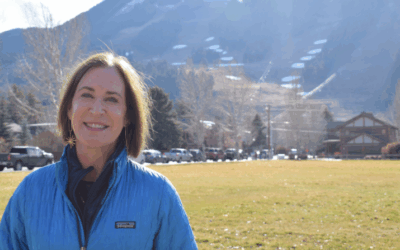Lawmakers returned to the floor of the Wyoming State Capitol Monday to begin debating hundreds of bills from a proposed voter identification requirement to a tax on tobacco. KHOL’s Will Walkey interviews statehouse reporter Nick Reynolds, formerly of the Casper Star-Tribune and now of the nonprofit publication WyoFile, about what to expect from this year’s legislative session. The following transcript has been lightly edited for clarity.
WILL WALKEY: I’ll start with this question. So, Wyoming’s legislature returned for the first in-person session this week. And in your first piece for WyoFile, you called it one of the most pivotal legislative sessions in the history of the state. Can you just outline for the listeners what the stakes are for the 2021 legislative session and why it is so important?
NICK REYNOLDS: Sure. Well, I think with this year’s session, we’re dealing with a lot of the similar issues that we’ve grappled with for decades at this point. The tax reform 2000 that was introduced by the Wyoming Taxpayers Association in the late 90s warned us that we had a couple of decades to update our state’s revenue streams to get away from a heavy reliance on minerals, fossil fuels—the things that have paid for our schools, our roads, [and] built our bridges for decades now. And that has only been exacerbated with the accelerated decline of coal that we’ve seen in the Powder River Basin over the last five years. Add that on top of a pandemic and a downturn in the investment markets for us, which is another huge area of income for the state, and we are looking at a situation where it’s more or less do or die. We’re actually looking to cut—people use this metaphor over and over—but we’re no longer cutting into the fat of the state’s budget. We’re actually cutting into the muscle and the bone at this point. Looking at some major programs that are actually very much relied on by some of the most vulnerable populations in our state.
WALKEY: The Wyoming legislature pushed right during the 2020 election. And I’m wondering, how are you expecting that rightward push to manifest itself in this incoming legislative session in terms of what’s being proposed and how things may change in Wyoming?

Nick Reynolds recently joined the nonprofit publication WyoFile after previously writing for the Casper Star-Tribune. (Courtesy of Nick Reynolds)
REYNOLDS: Well, I think the place where it’s going to become most apparent is probably in the budget and revenue discussions. With a very limited time to look at it, I think we’re looking at a one-month session at this point. More than 700 bills are likely to be in the hopper for drafting. We might only see like a couple hundred of those get through. But with only a month to work, it’s not very likely that a lot of the social legislation will get the type of hearing that you would typically see in a two-month session. The abortion bills, bills of that nature. While we’re seeing a lot of those bills being drafted, it’s still a question of whether or not leadership will actually give them their day on the floor. So, we may or may not see that element become apparent in this year’s session.
WALKEY: Obviously, some committees have already been doing some work. And a notable bill that advanced through committee is the photo ID requirement at the polls, which passed. As someone who covered it, what was the argument for passing that bill through committee and why is it so likely to pass [through the legislature]?
REYNOLDS: Well, we’re kind of dealing with a chicken and egg situation with this one, where we’re seeing a situation where voter confidence in states’ elections has been diminished. And they’re trying to address that by passing something that will make it seem more secure. That’s the line that we tend to be getting. The trust in the country’s elections was actually the opposite before November 6, where Democrats actually had lower confidence in the integrity of this year’s elections than Republicans did. And after November 6 came through, we sort of saw that flip where Republicans were suddenly more distrustful of the integrity of our country’s elections while Democrats were more in favor. What’s been interesting about this bill is that there has been a bipartisan coalition that has been able to kill it pretty consistently over the last couple of years that it’s come up. It’s been a priority for a while. It’s been run a few times, but it’s always managed to fall by the wayside. This year, the amount of response we’ve seen on this bill has been astounding.
WALKEY: Shifting back to this legislative session and all the different work that the lawmakers will have to do, you just talked about the budget and the myriad cuts that are going to have to be made. But also there are many lawmakers talking about alternative revenue sources. And I’m wondering, what are some of the main ways that lawmakers are trying to change things in terms of new revenue sources for the State of Wyoming?
REYNOLDS: There are a few sort of—I like to call them nickel and dime measures—that are out there. So, things like a fuel tax or the road usage charge or even the tolling I-80 bill, which is coming back this year, are looked at as ways to help accomplish that. Some of the more ambitious revenue policies probably won’t get a hearing, and those are looking mostly to just raise taxes on the super-wealthy residents of Jackson Hole in particular. There’s one bill out there that looks to implement basically a wealth tax, and it should raise upwards of $300 million, all to our schools—[it’s] basically anticipated to eliminate the state’s education deficit almost overnight.
WALKEY: You said you don’t think that those are likely to pass?
REYNOLDS: They haven’t typically in the past. I mean, anything could happen. We haven’t really seen any debate on those yet. They’re coming forward as individual bills. So, we will actually have to see if leadership will put those on the docket. But anything can happen.
WALKEY: My next and final main theme that I’d like to get at is, you know, obviously the energy landscape in Wyoming is really in flux. And given your reporting, and just from what you’ve witnessed, which direction do you think the Wyoming legislature is heading in terms of which industries it’s going to be supporting in the near future, law-wise?
REYNOLDS: Well, at the committee level, lobbyists for those industries have been pretty successful at making the economic case for continuing subsidies for renewable energy. They’re creating a bunch of jobs that are being shed by traditional minerals like coal at this point. And for a lot of people, there really is reason to continue to support them through subsidization and making sure that these projects will continue to be viable. At the same time, it’s getting to a point where some lawmakers see the state’s renewables industry as becoming more robust than they claim it is and believing that it’s time for them to pay their fair share. So, we’re seeing introductions of a wind tax. That hasn’t been too successful at the committee level, but there are a number of lawmakers who have been pushing for it. We’ve also seen the introduction of a solar generation tax this year. We’re getting to a pretty desperate point as far as the state’s revenue picture goes. So, you know, that might affect people’s thinking. But in the past, some of these new taxes on renewables haven’t been successful either.
WALKEY: You recently transitioned to WyoFile. And for your regular readers who loved your content at the Casper Star-Tribune, I’m wondering how might your content be changing? And if you’re willing to share, what were some of the reasons that you decided to make this transition from the Casper Star-Tribune to WyoFile?
REYNOLDS: I mean, I think the content itself isn’t really going to change too much. The biggest change that I really anticipate is that I’m just not going to be writing as much daily copy. You’re probably not going to see up-to-date details of what’s coming out of committees. For the most part today I’ve been going room to room, and instead of writing a 500-word story, I’ve just been taking notes and basically just looking for trends to emerge. You know, things that I could maybe take a step back, and instead of looking at things bill by bill, I can take a bigger perspective on things. It’s been kind of fun working for a daily newspaper for a while. It was something that I wanted to do. I actually came over from an alt-weekly after leaving a daily to join that alt-weekly. So, it was familiar ground for me, but I’ve never gotten the opportunity to work in nonprofit news before. That seemed like an intriguing prospect to me. And I do honestly think that nonprofit journalism is probably the future for a lot of newsrooms. And I kind of wanted to—I guess it’s not really the cutting edge anymore because so many nonprofit newsrooms have been successful—but it seemed like a really exciting change. And honestly, it just kind of seems like the direction that the industry’s heading in and one that, frankly, I’m supportive of and wanted to be a part of.






